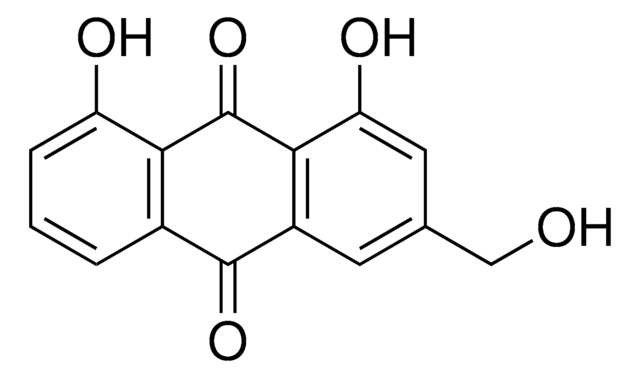B6906
Aloin
from Aloe barbadensis Miller leaves, ≥97%
Synonym(s):
1,8-Dihydroxy-10-(β-D-glucopyranosyl)-3-(hydroxymethyl)-9(10H)-anthracenone, 10-β-D-Glucopyranosyl-1,8-dihydroxy-3-(hydroxymethyl)-9(10H)-anthracenone, Aloin A, Barbaloin
About This Item
Recommended Products
biological source
Aloe barbadensis Miller leaves
Quality Level
Assay
≥97%
form
powder
solubility
methanol: 100 mg/mL, clear to very slightly hazy, light yellow to yellow
application(s)
metabolomics
vitamins, nutraceuticals, and natural products
storage temp.
2-8°C
SMILES string
OC[C@H]1O[C@H]([C@H](O)[C@@H](O)[C@@H]1O)[C@H]2c3cccc(O)c3C(=O)c4c(O)cc(CO)cc24
InChI
1S/C21H22O9/c22-6-8-4-10-14(21-20(29)19(28)17(26)13(7-23)30-21)9-2-1-3-11(24)15(9)18(27)16(10)12(25)5-8/h1-5,13-14,17,19-26,28-29H,6-7H2/t13-,14+,17-,19+,20-,21+/m1/s1
InChI key
AFHJQYHRLPMKHU-OSYMLPPYSA-N
Looking for similar products? Visit Product Comparison Guide
Related Categories
Application
Biochem/physiol Actions
Signal Word
Warning
Hazard Statements
Precautionary Statements
Hazard Classifications
Acute Tox. 4 Oral
Storage Class Code
11 - Combustible Solids
WGK
WGK 1
Flash Point(F)
Not applicable
Flash Point(C)
Not applicable
Personal Protective Equipment
Certificates of Analysis (COA)
Search for Certificates of Analysis (COA) by entering the products Lot/Batch Number. Lot and Batch Numbers can be found on a product’s label following the words ‘Lot’ or ‘Batch’.
Already Own This Product?
Find documentation for the products that you have recently purchased in the Document Library.
Customers Also Viewed
Our team of scientists has experience in all areas of research including Life Science, Material Science, Chemical Synthesis, Chromatography, Analytical and many others.
Contact Technical Service
![Benzo[a]pyrene ≥96% (HPLC)](/deepweb/assets/sigmaaldrich/product/structures/253/820/be96d879-1811-46c0-8f11-612019691c2d/640/be96d879-1811-46c0-8f11-612019691c2d.png)



![Benzo[a]pyrene-d12 98 atom % D](/deepweb/assets/sigmaaldrich/product/structures/962/892/b867e1bb-083c-4337-b499-36eae87f40ad/640/b867e1bb-083c-4337-b499-36eae87f40ad.png)







